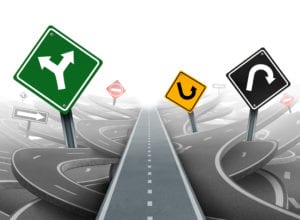 Perhaps you’ve heard it said that we are creatures of habit. The more we do something over and over again, the more likely that behavior will be turned into a habit.
Perhaps you’ve heard it said that we are creatures of habit. The more we do something over and over again, the more likely that behavior will be turned into a habit.
But what happens in the mystical world of the brain when a behavior becomes a habit? Is your behavior under stress predictable? Rational? Understandable? The answers may be unsettling.
Habits
Good or bad, we all have habits. On an emergency scene, good habits can save your life and bad habits can result in tragic consequences. So it stands to reason that you would want to form good habits and avoid bad habits, right? But what happens if you form a bad habit and aren’t aware of it? Can this happen? You bet it can and I see it all the time.
Fundamentally, your habits are formed through repetition in learning. Practice something a lot and you can learn it so well the task becomes automatic – a habit. When this happens you won’t even have to think about what you’re doing because you are programmed for automatic performance.
Automatic performance
The ability to perform high-risk, high consequence tasks properly, the first time, is at the core of why first responders train so often. There may only be one chance to get it right. Does repetition really make much difference? In a word – absolutely! It makes a huge difference. Watch this video from one of my Mental Management of Emergency programs where I am conducting an exercise that demonstrates how ridiculously important it is to form good habits and how it affects performance.
You can see how much performance is improved by repetition that results in memorization of a cognitive skill. But what about task performance? Are the lessons the same? Yes! Muscles can learn automatic performance as well as the neurons can learn cognitive scripts (data memorization).
Driving the point home
 Have you ever driven your car somewhere while you were distracted? Maybe you were actively engaged in a conversation with someone else in the vehicle. Or perhaps you just had something weighing heavily on your mind. Whatever the cause, your entire attention wasn’t on driving. Yet you still managed to arrive at your destination without getting into an accident. It it entirely possible that you may have no recall of some or most of the trip. How can you drive a vehicle with such little conscious effort?
Have you ever driven your car somewhere while you were distracted? Maybe you were actively engaged in a conversation with someone else in the vehicle. Or perhaps you just had something weighing heavily on your mind. Whatever the cause, your entire attention wasn’t on driving. Yet you still managed to arrive at your destination without getting into an accident. It it entirely possible that you may have no recall of some or most of the trip. How can you drive a vehicle with such little conscious effort?
The answer lies in a the power of learned scripts – routines – habits – that are formed from repetition of tasks. You drive a vehicle so often that you don’t even have to think about what your right foot is supposed to do when you see a traffic light changing from green to yellow. The response is automatic. Your foot leaves the gas pedal and depresses the brake pedal and you come to a stop. You do this so automatically that you don’t even give much thought to the amazing brain functions that facilitated that kind of automatic performance.
Stress and habits
You are a creature of habit under the best of conditions. Add stress and you become a slave to your habits. Your performance will become automatic scripted performances of learned behaviors that you may have learned years earlier. Responders who do dumb things at emergency scenes aren’t doing dumb things on purpose. Most of the time their performance is a reflection of their training – the habits they have formed over time.
Here’s a teaser video of an incident I was told about by a police officer during one of my programs in Nevada. The police officer who shared the story with me was not involved in the incident I describe in the video. He did, however, see the recorded footage of the incident. After you watch the video, read on and I’ll share with you how the story ends.
In this scenario, the police officer behaved in a very unexpected way. Some would even say his behavior was dumb.
That was dumb
The police officer does not perform a take-down and handcuff maneuver which is what you might expect. That’s rational. Instead, the police officer hands the gun back to the assailant and puts his hands up in the air again. That… is not rational. In fact, you might say that was dumb. But there’s an explanation. The police officer was trained to fail.
Defensive tactics training
During the officer’s defensive tactics training the instructor did not require to students to perform a take-down and handcuff maneuver after disarming their mock suspect. Instead, the instructor verbally told the students to do the take-down and handcuff maneuver. But the muscles were learning something very different than the cognitive instructions. The muscles were learning to hand the gun right back to the assailant for a ‘do-over’ of the drill. Over and over and over again this was practiced. All the while, creating a habit that, if not for this officer’s partner intervening, might have cost him his life.
During the Mental Management of Emergencies program I share with attendees the brain science behind habit formation and the dangerous mistakes that can be made in the training of responders. Mistakes that seem innocent, yet can have catastrophic outcomes. You are a slave to your habits under stress and you can be trained to fail as much as you can be trained to succeed.
Rich Gasaway’s Advice
 This one is simple (but perhaps not easy). Practices does not make perfect. Practice makes permanent. Design and conduct training to ensure the performance of skills mirrors the desired performance at an emergency scene. If you take shortcuts in training. Those shortcuts become your automatic skill performance under stress.
This one is simple (but perhaps not easy). Practices does not make perfect. Practice makes permanent. Design and conduct training to ensure the performance of skills mirrors the desired performance at an emergency scene. If you take shortcuts in training. Those shortcuts become your automatic skill performance under stress.
Do not think for one moment that you can use logic to talk yourself out of doing something differently when the pressure is on. In other words, don’t train one way and then use the logic: If this were a real emergency I’d do it differently. That is flawed logic. In fact, under stress your logical brain isn’t even functioning as it would be if you were not under stress. That’s a lesson I’ve made abundantly clear in other articles.
Action Items
 1. Identify and discuss some bad habits that you may have developed as a result of how you were trained?
1. Identify and discuss some bad habits that you may have developed as a result of how you were trained?
2. Identify and discuss examples where your training may not mirror the skills you would perform in a real scenario?
3. What are some ways you can develop and maintain good habits of both cognitive skills and muscle memory skills?
4. Discuss an example where someone has done something the appeared to be dumb but in hindsight it was a reflection of a habit formed over time.
_____________________________________________________

If you are interested in taking your understanding of situational awareness and high-risk decision making to a higher level, check out the Situational Awareness Matters Online Academy.
CLICK HERE for details, enrollment options and pricing.
__________________________________
Share your comments on this article in the “Leave a Reply” box below. If you want to send me incident pictures, videos or have an idea you’d like me to research and write about, contact me. I really enjoy getting feedback and supportive messages from fellow first responders. It gives me the energy to work harder for you.
Thanks,

Email: Support@RichGasaway.com
Phone: 612-548-4424
SAMatters Online Academy
Facebook Fan Page: www.facebook.com/SAMatters
Twitter: @SAMatters
LinkedIn: Rich Gasaway
YouTube: SAMattersTV
iTunes: SAMatters Radio

Hello Doc,
While at Cal Fire as a driving Captain in wildland. We were drilled in EVOC & Pump skills such as emergency lane change 100’s of times over 6 weeks to develop “muscle memory”. It worked on several occasions I was able to detect a hazard ahead in time to slow and maneuver without over correction such that the crew members would afterward be amazed that we didnt have a negative outcome. On the negative side there are groups of days in initial attack of large fires that I drove, pumped and commanded and for 72 hours and cant recall much of it but I logged the command milestones in my 214. Many, many long familiar drives as a robot. My training was stout but I wonder if I would have had the SA to adjust from the model when it didnt fit the situation. I can recall adjusting succesfully on several occasions to fire threats but wonder how many times it would take before there was a failure while reduced to muscle memory instead of being cognitive while too fatigued.